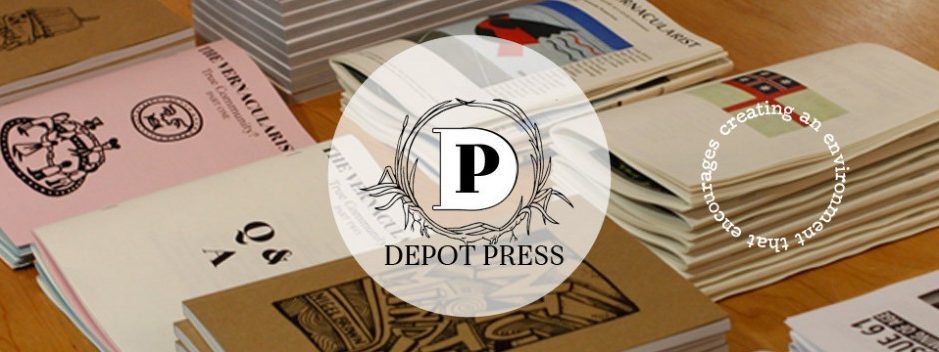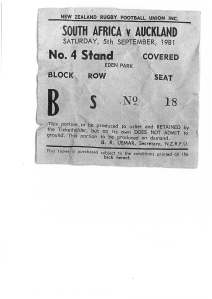Just the Ticket: A slice of NZ history in a pocket
A brown suede coat discovered in a local op shop yielded an interesting piece of New Zealand history. A Devonport friend with a penchant for retro fashion tried on a stylish suede coat made in New Zealand under the long retired label Selby, an item of interest in itself. In the pocket she found a ticket to a rugby game, South Africa versus Auckland at Eden Park, dated Saturday, 5th September, 1981, one of 16 matches scheduled to be played around New Zealand.
Below follow pieces of writing from the Ministry of Culture and Heritage website which describe the protest against the Springbok Tour but do not divulge the reason for such impassioned action, the stand against apartheid in South Africa.
A country divided
For 56 days in July, August and September 1981, New Zealanders were divided against each other in the largest civil disturbance seen since the 1951 waterfront dispute. More than 150,000 people took part in over 200 demonstrations in 28 centres, and 1500 were charged with offences stemming from these protests.
To some observers it might seem inconceivable that the cause of this unrest was the visit to New Zealand of the South African rugby team (the Springboks). Although not a major sport on a global scale, rugby has established itself not only as New Zealand’s number one sport but as a vital component in this country’s national identity. In many ways the playing of rugby took a back seat in 1981, and the sport suffered in the following years as players and supporters came to terms with the fallout from the tour.
Some commentators have described this event as the moment when New Zealand lost its innocence as a country and as being a watershed in our view of ourselves as a country and people.”
” This was a tour of New Zealand’s provincial heartland – to the homes of grassroots rugby – but the 1981 Springbok tour, which began in Gisborne on 22 July, pitched New Zealanders against each other.
Anti-tour protestors turned up to every match, and in centres all around the country match day became a day of action. At the three test matches, in particular, pro-tour and rugby fans clashed head on with the anti-tour movement. http://www.nzhistory.net.nz/culture/1981-springbok-tour
Many have commented that it was a miracle that no one was killed. The police presence grew during the tour and included two riot squads, Red and Blue. Kitted out in visored helmets and carrying PR24s or long batons, they became an enduring symbol of the tour, as were the anti-tour protestors in their crash helmets, shields and body armour.his was a tour of New Zealand’s provincial heartland – to the homes of grassroots rugby – but the 1981 Springbok tour, which began in Gisborne on 22 July, pitched New Zealanders against each other.
Anti-tour protestors turned up to every match, and in centres all around the country match day became a day of action. At the three test matches, in particular, pro-tour and rugby fans clashed head on with the anti-tour movement.
Many have commented that it was a miracle that no one was killed. The police presence grew during the tour and included two riot squads, Red and Blue. Kitted out in visored helmets and carrying PR24s or long batons, they became an enduring symbol of the tour, as were the anti-tour protestors in their crash helmets, shields and body armour.
http://www.nzhistory.net.nz/media/interactive/interactive-springbok-tour-schedule


